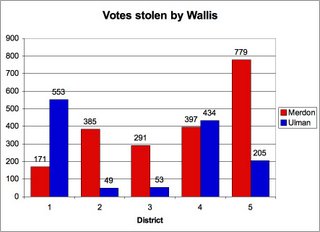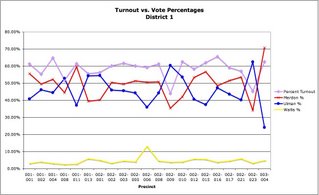I’ve gone back and forth on this for a while, but after attending the final County Executive candidates’ forum Sunday, I decided it was ultimately worth writing.
I support Ken Ulman for County Executive.
This shouldn’t come as a surprise to any readers -- though some might feign it for effect. But while my support for Ulman hasn’t been a secret, it hasn’t been explained much, either. And that’s what I hope to do here.
Sunday’s forum was sponsored by the Howard County Chinese School, which provides weekly classes on Chinese language and culture for local students.
Many of the questions asked of the candidates -- each of whom sat at tables covered with appropriately colored cloths (blue for Ulman, red for Merdon and white for Wallis) -- were standard forum fare – education, growth, transportation, etc. There were a few questions specifically about the Chinese and other immigrant communities.
But there was only one question that really stood out.
Towards the end of the event, after the floor was opened for audience questions, a woman began by mentioning the youthfulness of the non-independent candidates and followed by stating that only a fool would think these two don’t have political aspirations beyond County Executive. Which is completely true for both, no matter what they or their defenders say.
Given that they may soon seek to represent her on the state or federal level, she wanted to know how the candidates feel about some of the moral questions facing society today. And, naturally, she picked the most controversial of the bunch: abortion, stem cell research and gay marriage.
Wallis answered first and punted.
Merdon answered second and likewise ducked the questions.
Ulman stood up and responded to all three.
And in that moment, the differences between the two (well, three) and the reasons I’ve supported Ulman became even clearer.
When faced with the decision to follow principles or expedience, Ulman has chosen principles every time. Often, the two are no different, as was the case when he first proposed the charrette as a way to give citizens unprecedented zoning power and a real stake in the future of our community.
But just as often, they’re divergent, as was the case when he chose not to denounce the charrette and the planning department when their popularity began to wane, opting instead to support the messy, if all too public, process of working through the details to create a true compromise plan.
Like many of us who were raised in this county, Ulman is guided by bold principles and a strong vision for our future of Howard County, one that calls for exceeding our already high standards for education, public safety, and livability. The strength of his vision and principles are manifested in the strength of his actions. When it became clear that Howard County had fallen behind other jurisdictions with respect to public health and indoor smoking, Ken pushed for a quick and encompassing ban, while his opponent sought the path of greatest expedience, a blatant attempt to have it both ways on the issue (supporting it for residents, opposing it for business) that was similar to his approach on Comp Lite and the subsequent rezonings.
In short, he has positive, optimistic vision of the possible – a product of strong convictions and principles – and goes after it.
Ulman understands that being good is easy, but being great requires bold and forward thinking. Jim Rouse wasn’t trying to build suburbs with a few apartments thrown in for good measure, he sought to reorder how we think about community building and, in the process, create places where growth was talked about in terms of individuals, not just building units.
Sometimes, of course, boldness backfires, as it did when Ulman was criticized for proposing to change the zoning process during an election; a proposal that I believe will be vindicated eventually, as Oakland Mills has shown the power of proactive, community-based planning. But, ultimately, what we need are leaders who challenge rather than pander, who are unafraid to take reasonable, principled risks when there is a strong community behind them to help guide the ideas to realities.
Politics is not for those who would rather sit on the sidelines. By failing to answer the question posed of him, Merdon indicated that he would rather take a back seat than take a chance. Sure, it was only one question – and a controversial one that certainly would have hurt him in his quest to lure Democrats – but nonetheless, avoiding tough situations is not going to solve the problems we’ll face in the years ahead.
If I told you three years ago that by 2006 citizens will be in control of the Columbia downtown development process, would you have believed me? If your answer is yes, you’re not being honest. At that time, all most wanted was a seat at the table. Instead of a seat, we got the table.
As I said before, the master plan process hasn’t been perfect, but nothing is. That some would like to stop it entirely says more about their willingness to cope with difficulties than their commitment to a strong citizenry and a fruitful community dialogue.
Now, Town Center is but one issue we’re facing. There are many more: transportation, affordable housing, continued excellence in our schools, loss of open space, development pressures and so forth. To me, the question is not will we find a solution to these problems, but how?
Will we continue to adjust the bus schedules to get a few more riders, or will we create a truly effective and efficient system to cope with (hopefully, in the decades ahead) a decline in automobile use?
Will we create healthy, mixed income neighborhoods that respect our community’s character and open space at the same time they provide a range of housing options for those who need it? Or, will we add a few affordable units here and there until it becomes clear that the gates are closed?
Will we create a development system that truly benefits and empowers citizens, or will we keep doing what we’re doing, with small adjustments for "inflation"?
Will our open spaces continue to suffer the ill and exponential effects of development that has already occurred, or will we find ways – through mitigation, restoration and redevelopment – to bring back healthy, functioning ecosystems?
Will our schools excel beyond where they are now by attracting the best teachers and administrators (who need both good pay and affordable housing), or will we rest on our laurels?
The possibilities for us are endless. We are a strong community with a strong foundation to work from. If we are committed to fully addressing the problems we face, we need to act with strong purpose, for the challenges loom large. And, I believe, Ken Ulman is poised to face those challenges head on for us and our future.
By the way, I think Ulman wins it by 5.






